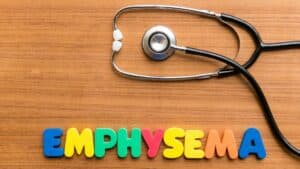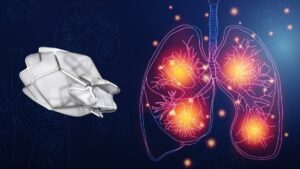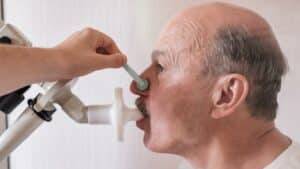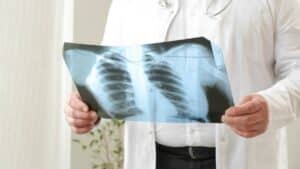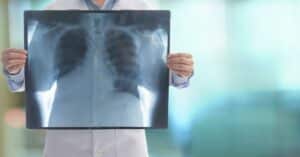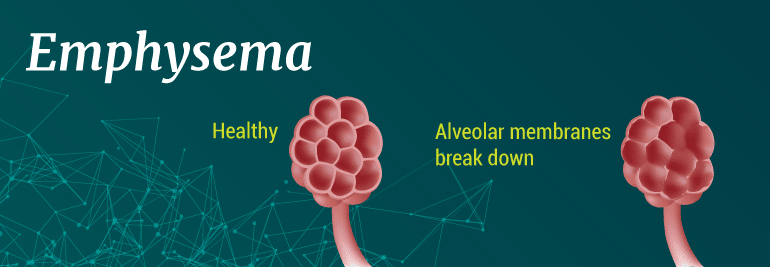
What Is Emphysema?
Emphysema is one of the major obstructive lung diseases under the chronic obstructive pulmonary disease (COPD) umbrella. This lung condition gradually destroys the air sacs in the lungs, making it progressively more difficult to breathe.
The tiny cluster-like air sacs in the lungs are responsible for bringing oxygen to the bloodstream. As emphysema progresses, the inner walls of the air sacs form holes, weakening their internal structure. The disease deters oxygen from reaching the bloodstream.
Emphysema also destroys the elasticity of the airways that lead to the air sacs. As a result, the air sacs collapse, trapping oxygen in the lungs. Sufferers of emphysema constantly struggle to breathe.
Emphysema is a progressive condition that worsens over time. While there is no cure for this condition, there are treatment options available that can help reduce the symptoms so you can gain back some of the quality of life you lost.
The best way to treat emphysema is to identify the symptoms and diagnose the condition early so you can begin treatment as soon as possible. If you suspect that you have emphysema, take a moment to read through the symptoms and other information about this condition and see what treatment options might be available to you.
Symptoms of emphysema
Emphysema symptoms can vary from patient to patient, but they almost always include shortness of breath due to the lack of oxygen in the lungs. As the inflammation in the lungs worsens, the airways are obstructed and the oxygen cannot reach the bloodstream. This can cause a number of symptoms, including:
- Chronic cough
- Shortness of breath
- Frequent respiratory infections, sometimes that lead to hospitalization
- Blueness of the lips or fingernail beds from lack of oxygen
- Chronic fatigue
- Excessive mucus
- Wheezing
These symptoms of emphysema are the first indicators that you may have this condition. If you are experiencing any or all of these symptoms, you should contact our doctor immediately to schedule an appointment. Early detection is the key to treating your emphysema, and some treatments may even help slow the progression of your condition.
Causes of emphysema
There are several factors that can cause emphysema to develop. Typical to most inflammatory lung conditions, emphysema is often caused by habitual smoking. The harmful chemicals breathed in from cigarettes can irritate the lungs, causing inflammation and scar tissue to develop. As this worsens with time, the symptoms of chronic cough and shortness of breath may appear.
Because emphysema has not been linked to any hereditary factors, doctors contribute this condition to lifestyle choices. Smokers are among the most common to develop emphysema, followed by people who work with harmful dust and chemicals.
Other factors may include:
- Gender – Historically, men had developed emphysema more often than females. Starting in 2011, women have reported a higher rate of emphysema diagnosis than men.
- Age – Older people are at a higher risk for developing emphysema. Emphysema is a progressive disease, which worsens over time and as you age, your physical health begins to decline. As a result of these two factors, older individuals are more likely to develop the disease.
Diagnosing emphysema
If you have been experiencing symptoms of emphysema, and you have made lifestyle choices that contribute to the development of this disease, you should schedule an appointment with you doctor to confirm an emphysema diagnosis.
The diagnosis process varies, but almost always includes two or more of the following steps:
- A conversation about your medical history and lifestyle choices
- A physical exam where you doctor listens to your lungs
- A pulmonary function test that requires you to blow into a mouthpiece that measures your lung strength and capacity
- X-ray tests
- Lab tests and blood work
Once your doctor confirms a diagnosis for emphysema, you two can work together to create a treatment plan that is right for you.
Emphysema Prognosis and Stages – Looking to The Future
When it comes to receiving an initial emphysema diagnosis, the prospect of the future can be hard to imagine. For starters, there is no current cure for emphysema. And in order to diagnose and grasp the severity of your disease, you may be asked to undergo a detailed medical history, various tests as well as other recommended procedures.
Of these tests, one may be a simple pulmonary function test (PFT) to determine your condition as well its severity. Other tests may include a 6-minute walk test to assess your tolerance to exercise as well as chest x-rays, blood tests and CT scans.
From these tests, your emphysema will likely be placed into the following stages:
- Very mild or Stage 1: Very mild emphysema with a FEV1 about 80 percent or more of normal.
- Moderate or Stage 2: Moderate emphysema with a FEV1 between 50 and 80 percent of normal.
- Severe or Stage 3: Severe emphysema with FEV1 between 30 and 50 percent of normal.
- Very severe or Stage 4: Very severe emphysema with a lower FEV1 than Stage 3, or those with Stage 3 FEV1 and low blood oxygen levels.
Although the staging system of emphysema is meant to be a general guidepost to disease severity, nobody can truly predict emphysema life expectancy. Rather, doctors use tests and procedures to make general estimates on what to expect regarding future outcomes.
Keep reading for more information on determining your emphysema prognosis and treatment options.
Treatment options for emphysema
Once you have a confirmed diagnosis of emphysema, you can begin to research the treatment options available to you. In most cases, doctors will recommend traditional treatments, such as medications, inhalers and oxygen therapy. These treatments for emphysema are great at reducing symptoms when they appear, but they are not preventative in nature.
Emphysema Management Tips – How to Stay Healthy
When it comes to emphysema, often the best tips for managing the disease are the most obvious. Here’s a short-list on the next steps to breathing better and staying healthy.
- Quit Smoking– We’ve said it before and we’ll say it again, quitting is the best thing you can do for your life right now and moving forward.
- Avoid Lung Irritants– Whether its second-hand smoke, poor working environments, pollen in the air or pollution, keep your environment pure and clean for your lung health.
- Vaccinate, Vaccinate, Vaccinate- the worst thing you can do for your emphysema is to expose it to the influenza virus. Get immunized at the start of flu-season every year.
- Keep Your Living Space Clean- this entry goes hand-in-hand with avoiding lung irritants. Keep smoke out of your house and don’t do anything excessive (like grilling indoors) to cause the development of new lung irritants from inside your home. Replace your air filters, and be vigilant of mold in moist areas (your bathroom namely)
- Eat Right and Exercise- this may sound like it’s simple, but for the majority of Americans, maintaining a healthy diet and exercise plan is incredibly However, as hard as it may be, your health depends on it. So, start today at the grocery store and give yourself a quick walk-around the block before dinner. Your heart and lungs will thank you.
